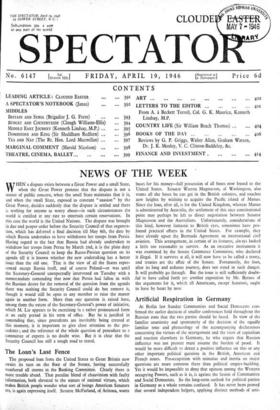NEWS OF THE WEEK
WHEN a dispute exists between a Great Power and a small State, when the Great Power protests that the dispute is not a matter of public concern, when the small State maintains that it is, and when the small State, exposed to constant " suasion" by the Great Power, decides suddenly that the dispute is settled and there is nothing for anyone to worry about—in such circumstances the world is entitled at any rate to entertain certain reservations. In this case the world is the United Nations. The dispute was brought in due and proper order before the Security Council of that organisa- tion, which has deferred a final decision till May 6th, the date by which Russia undertakes to have withdrawn her troops from Persia. Having regard to the fact that Russia had already undertaken to withdraw her troops from Persia by March 2nd, it is the plain duty of the Security Council to ,keep the Russo-Persian question on its agenda till it is known whether the new undertaking has a better issue than the old one. Thar is the view of all the States repre- sented except Russia itself, and of course Poland—or was until the Secretary-General unexpectedly intervened on Tuesday with a memorandum contending that now that Persia had fallen in with the Russian desire for the removal of the question from the agenda there was nothing the Security Council could do but remove it, though it would still be open to any member to raise the matter again in another form. More than one question is raised here, among them the extent of the Secretary-General's power of initiative, which M. Lie appears to be exercising in a rather pronounced form at an early period in his term of office. But he is justified in contending that, since precedents are inevitably being created at this moment, it is important to give close attention to the pre- cedents ; and the reference of the whole question of procedure to a committee of experts is no doubt wise. But it is clear that the Security Council has still a rough road to travel.






























